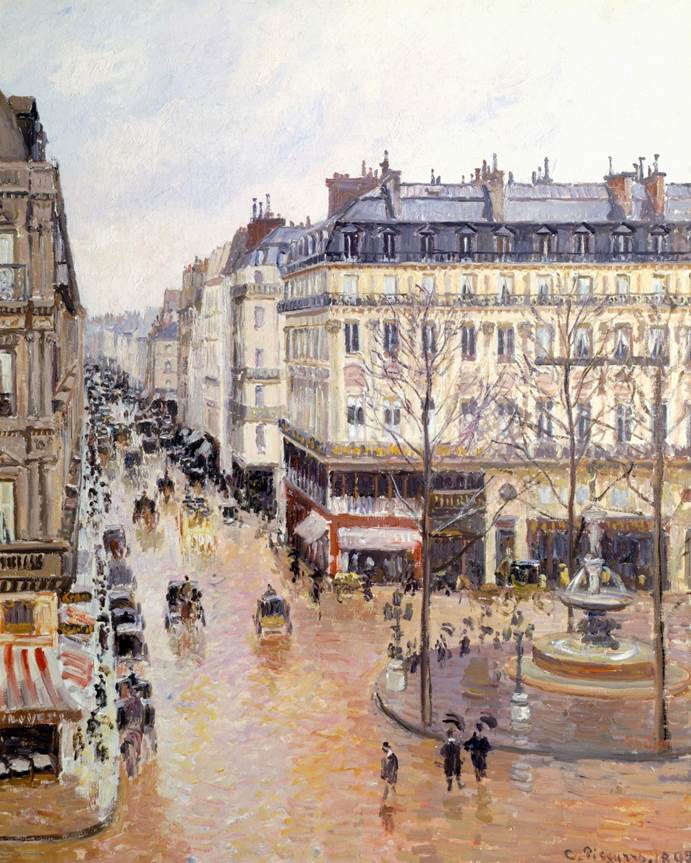As potential regulation of the art market gathers in the United States, the increasing relevance of the Responsible Art Market Initiative is ever clearer. And while we will miss gathering in Geneva for the first time in several years, RAM is undeterred. Join us on Friday January 29, 2021 for a virtual edition of the annual RAM event, this year entitled “Innovation and change in a Responsible Art Market.” The program follows below (including a virtual networking opportunity), and registration by 27 January 2021 can be accomplished using the following link: www.responsibleartmarket.org/event-registration.
See you then. Until next year, this will have to suffice for ein Stückchen der Schweiz from last February:
Read More
Topics:
Anne Laure Bandle,
Reibpartie,
Pierre-Auguste Renoir,
Art Law Foundation,
New York University,
TEFAF,
Geneva,
Sandrine Giroud,
Lalive,
Albert Martin Wolffson,
Eugene Driker,
Sullivan & Worcester LLP,
Henry Zacharias,
Copyright,
EPA Victory,
Sullivan and Worcester LLP,
Bonhams,
Nicholas M. O'Donnell,
Elmyr de Hory,
Mathilde Heaton,
RAM,
Responsible Art Market initiative,
Phillips,
Stephenson Harwood,
Jonathan Petropoulos,
Nanne Dekking,
Artory,
National Defense Authorization Act,
Nicolas Galley,
Borel & Barbey,
Valentina Volshkova,
Masterworks,
Tom Christopherson,
Melanie Damani,
Pace Gallery,
University of Zurich,
Masha Golovina,
Hottinger Group,
Freya Simms,
LAPADA,
The Association of Art and Antiques Dealers,
Audry Li,
Zhong Lun Law Firm,
Shanghai

On January 1, 2021, the U.S. Senate overrode President Trump’s veto of the National Defense Authorization Act for 2021 (NDAA), a bill that (perhaps surprisingly) included rules affecting the art market. Specifically, the new law subjects antiquities dealers to the provisions of the Bank Secrecy Act, requires registration of the ultimate beneficial ownership of limited liability companies, and directs the Financial Crimes Enforcement Network (FinCEN) at the Department of the Treasury to conduct a study of money laundering in the art market. Long considered but only now passed, the bill is a significant step into regulating the U.S. art and antiquities market, though still far less invasive than the European Union’s current approach. The new regulations raise questions about the cost benefit balance of compliance, but leave no doubt after last year’s Senate report that regulators have the art market in their sights and the market must respond if it wants to have a say in the oversight that is sure to come.
Readers here will be familiar with our support for and participation in the Responsible Art Market Initiative’s common-sense approach to diligence and responsible practices, and this development is no exception. As I tried to spotlight in the RAM New York webinar we hosted last fall, whatever one thinks of the regulations or the regulators, these things are happening. And while we expressed skepticism that FinCEN is the right body to conduct a study of the art market, the market has a choice here. We can complain, or we can get involved in the dialogue. I would rather be at the table in the discussion than outside the room. The FinCEN study may not be ideal, but it is an opportunity that responsible actors will ignore at their peril.
Read More
Topics:
OFAC,
European Union,
Terrorist financing,
Responsible Art Market initiative,
Money laundering,
FinCEN,
Financial Crimes Enforcement Network,
Office of Foreign Assets Control,
Bank Secrecy Act,
Department of the Treasury,
31 U.S.C. § 5312(a),
limited liability companies,
National Defense Authorization Act,
President Trump
(WASHINGTON-October 22, 2020) The heirs to the Jewish art dealers who were forced to sell the medieval devotional art collection known as the Welfenschatz (in English, the Guelph Treasure) to agents of Hermann Goering in 1935 filed their brief today in the Supreme Court of the United States. It can be viewed at this link. The Supreme Court is set to hear argument on December 7, 2020, on whether the Foreign Sovereign Immunities Act (FSIA) and its “takings clause” create jurisdiction over the heirs’ claims for restitution of the Welfenschatz—as all reviewing courts so far have held. The Welfenschatz is held by the Stiftung Preussischer Kulturbesitz (in English, the Prussian Cultural Heritage Foundation).
Read More
Topics:
Third Reich,
Gestapo,
Z.M. Hackenbroch,
Prussia,
Germany,
Nazi-looted art,
Foreign Sovereign Immunities Act,
Markus Stoetzel,
Supreme Court,
Mel Urbach,
SPK,
Nuremberg race laws,
Stiftung Preussischer Kulturbesitz,
Hermann Goering,
FSIA,
NS Raubkunst,
Sullivan & Worcester LLP,
J.S. Goldschmidt,
Gerald Stiebel,
Prussian Cultural Heritage Foundation,
Adolf Hitler,
Nicholas M. O'Donnell,
Alan Philipp,
Welfenschatz,
I. Rosenbaum,
Paul Körner,
Wannsee Conference,
Jed Leiber,
House of Brunswick (Braunschweig)-Lüneberg,
Emily Haber,
Wilhelm Stuckart,
Final Solution
Longtime readers of the Art Law Report will know of the remarkable success over the last several years of the Responsible Art Market Initiative in Geneva. RAM began initially in connection with a collaboration by the Art Law Centre at the University of Geneva and the Art Law Foundation (Fondation pour le droit de d’art), also in Geneva. RAM has held annual events in Geneva at artgeneve for several years. Indeed, the RAM event this past January was one of the last times I was able to visit Europe before the world shut down.
Read More
Topics:
sanctions,
Pryor Cashman LLP,
Pippa Loengard,
Irina Tarsis,
Sullivan & Worcester LLP,
Suzanne Gyorgy,
Megan Noh,
Center for Art Law,
RAM,
Responsible Art Market initiative,
Money laundering,
CitiBank,
Birgit Kurtz,
Nanne Dekking,
Artory,
Lockton Companies,
Andrew Schoelkopf,
Elaine Wood,
Charles River Associates,
Jill Arnold Bull
Robin Pogrebin at the New York Times has written an excellent piece on the news that the Brooklyn Museum intends to sell several works from its collection to raise money. The museum explicitly relies on the pandemic-inspired announcement in April by the Association of Art Museum Directors (AAMD) relaxing its industry guidance (and pausing sanctions) with regard to the proceeds of the sale of art and how the resulting proceeds should or should not be used. The parallel announcement by a Syracuse museum that it intends to sell a Jackson Pollock painting in a manner more consistent with the old rules provides an instructive moment to consider what has really changed in six months of a new era.
Read More
Topics:
The Art Newspaper,
Jackson Pollock,
Deaccessioning,
Boston Globe,
Association of Art Museum Directors,
Lucas Cranach the Elder,
New York Times,
AAMD,
Berkshire Museum,
Apollo Magazine,
Brooklyn Museum,
Robin Pogrebin,
Syracuse University,
Anne Pasternak,
Lucretia,
Courbet,
Corot,
Red Composition,
Lisa Simpson,
Donato de’ Bardi,
NY Board of Regents,
Jeff Jacoby,
C. Montgomery Burns,
Royal Academy of Arts

The U.S. Court of Appeals for the Ninth Circuit yesterday affirmed the 2019 judgment that allowed the Thyssen-Bornemisza Collection Museum in Madrid to retain Camille Pissarro’s Rue St. Honoré, après-midi, effet de pluie (Rue St. Honoré, Afternoon, Rain Effect) (1892), a painting sold under duress by Lilly Cassirer to a Nazi in 1939. Absent rehearing by the full Ninth Circuit or Supreme Court review, the decision may bring to an end the Cassirers decades-old effort to win restitution of a painting that no one disputes is Nazi-looted art, yet the museum refuses to return. The result turns on the highly deferential standard of review for findings of fact by the trial court about the state of knowledge by Baron Hans-Heinrich Thyssen-Bornemisza when he acquired the painting in 1976. Yet the Ninth Circuit’s lack of enthusiasm for this result fairly leaps off the page, however, first with its decision to issue an unsigned opinion not for publication, and by seconding the District Court’s disappointment in the ruling under review “that Spain and TBC’s refusal to return the Painting to the Cassirers is inconsistent with Spain’s moral commitments under the Washington Principles [on Nazi-Confiscated Art] and Terezin Declaration.” The Court of Appeals’ statement about Spain and the museum that “It is perhaps unfortunate that a country and a government can preen as moralistic in its declarations, yet not be bound by those declarations” is a reminder of the limitations of these moral imperatives that, ironically, many current possessors argue are sufficient to address the problem of Nazi-looted art. It is absolutely true that moral principles often do not have the force of law. It is equally true, however, that flouting moral principles warrants moral sanction. And as multiple judges of the United States have found, Spain deserves just that.
Read More
Topics:
Terezin Declaration,
Thyssen-Bornemisza Collection,
Rue St. Honoré après-midi êffet de pluie,
Claude Cassirer,
Cassirer,
Foreign Sovereign Immunities Act,
Washington Principles on Nazi-Confiscated Art,
Stiftung Preussischer Kulturbesitz,
FSIA,
expropriation exception”,
Baron Hans-Heinrich Thyssen- Bornemisza,
Welfenschatz,
A Tragic Fate,
Reichskammer der bildenden Künste,
Jakob Scheidwimmer,
Reich Chamber of the Visual Arts,
Madrid
A recent report by the U.S. Senate Permanent Subcommittee on Investigations (headlined by Chairman Senator Rob Portman, Republican of Ohio, and Ranking Member Tom Carper, Democrat of Delaware) has drawn widespread attention for its damning statements about the international art market. Focusing on purchases of art from major auction houses by Arkady and Boris Rotenberg, two Russian nationals described as “oligarchs” by the report, the Subcommittee makes a series of pronouncements about the supposed prevalence of money laundering in the art market, and the need for regulation to address this perceived problem. Yet upon closer read, the report is a recycling of clichés about the art market, a detailed description about the considerable diligence by the auction houses far beyond what any even theoretical regulation would require (thus begging the question of what lesser regulation would accomplish), and no discussion or empathy at all for the vast majority of small art businesses that could not possibly comply with such regulation and stay in business, let alone actually combat money laundering. In other words, in concluding that two men laundered money, the Senate committee deduces that the practice is rampant. This hardly follows as a matter of logic. Far from supporting the case for sweeping financial regulation of the art market, the report unintentionally makes the opposite point.
Read More
Topics:
OFAC,
Vladimir Putin,
Uniform Commercial Code,
House of Representatives,
New York Times,
Responsible Art Market initiative,
Money laundering,
FinCEN,
Financial Crimes Enforcement Network,
Permanent Subcommittee on Investigations,
Boris Rotenberg,
oligarch,
shell companies,
suspicious activity reports,
Banking Secrecy Act,
Politically Exposed Persons,
Arkady Rotenberg,
Treasury,
ultimate beneficial owner,
UBO,
Corporate Transparency Act of 2019,
Tom Carper,
Office of Foreign Assets Control,
Rob Portman
(WASHINGTON-July 2, 2020) The United States Supreme Court today agreed to hear the appeal by Germany and the Stiftung Preussischer Kulturbesitz (SPK) seeking to dismiss the restitution claim by the heirs to the so-called Guelph Treasure (known in German as the Welfenschatz). The claims arise out of the forced transfer in 1935 of the Guelph Treasure by a consortium of Jewish art dealers to agents of Hermann Goering, who personally presented it as a gift to Hitler. In 2018, the Court of Appeals for the D.C. Circuit held that U.S. courts have jurisdiction over the claim under the Foreign Sovereign Immunities Act of 1976 (FSIA). That appellate court had rejected the Defendants’ arguments that U.S. courts lack jurisdiction, and that Germany’s treatment of its Jews in the 1930s should be immune from judicial scrutiny.
Sullivan partner Nicholas M. O’Donnell said, “we are grateful for the opportunity to address the Supreme Court on these important questions about holding Germany accountable for its Nazi-looted art. A 1935 transfer from German Jews to notorious art looter and war criminal Hermann Goering is the quintessential crime against international law, regardless of Germany’s Holocaust distortion in defending this case. Germany seeks to eliminate recourse for Nazi-looted art and the Court will have the chance to answer this question of critical importance for Holocaust victims.” O’Donnell added, “this is also an opportunity to rebuke the Department of Justice and State Department, who turned their back on decades of U.S. policy by siding with Germany’s effort to keep Nazi-looted art.”
Read More
Topics:
United States Supreme Court,
Nazi-looted art,
Department of Justice,
SPK,
Stiftung Preussischer Kulturbesitz,
Hermann Goering,
NS Raubkunst,
Gerald Stiebel,
Prussian Cultural Heritage Foundation,
Federal Republic of Germany,
Alan Philipp,
Welfenschatz,
State Department,
Paul Körner,
Jed Leiber
On behalf of my clients seeking restitution of the Guelph Treasure, or Welfenschatz, we filed today our supplemental brief with the U.S. Supreme Court in response to the Brief of the United States as Amicus Curiae that the Solicitor General’s office submitted on May 26, 2020. You can read today’s brief here, and read more about the particular problems with the Solicitor General’s filing here, most notably the contention that the Nazis’ property crimes against German Jews should be considered a “domestic” issue that doesn’t implicate international law under the Foreign Sovereign Immunities Act (FSIA). It was particularly distressing that the brief was signed not only by the U.S. Department of Justice, but also the State Department.
The filing follows an increasing pattern of disregard for bipartisan Congressional action, in this case the 2016 Holocaust Expropriated Art Recovery Act. Similarly, the 2017 Justice for Uncompensated Survivors Act that was enacted specifically to counter Poland’s and others’ hostility to restitution for Holocaust era assets has been ignored. The JUST Act required that the State Department issue a report on other countries’ restitution progress no later that November 9, 2019, yet no report has been issued. The State Department has a dedicated page on the JUST Act...which simply lists the law (Poland's embassy has its own rather self-serving version too). Something very curious is going on with restitution at the State Department, all the more heartbreaking given the 80 years of leadership on the topic by the United States.
Read More
Topics:
Foreign Sovereign Immunities Act,
Supreme Court,
SPK,
Stiftung Preussischer Kulturbesitz,
FSIA,
Welfenschatz,
State Department,
HEAR Act,
JUST Act,
solicitor general

Late Tuesday evening—the day after Memorial Day no less—the United States Office of the Solicitor General filed a brief amicus curiae in our clients’ pending case against the Federal Republic of Germany and the Stiftung Preussischer Kulturbesitz for restitution of the Guelph Treasure (in German, the Welfenschatz). This brief was in response to the Supreme Court’s invitation in January that the SG file a brief expressing the views of the United States. In an unprecedented abdication of 80 years of leadership redressing Nazi-looted art, the Solicitor General argued that there is no circumstance in which a Nazi-forced sale victimizing a German Jew in the 1930s could constitute a violation of international law such the Foreign Sovereign Immunities Act would confer jurisdiction over either Germany or the SPK. The U.S. government has taken the position that only property claims against non-Germans suffice—even though, of course, the U.S. government has acknowledged in every relevant context since the early 1940s that Jews ceased to be full members of German society on the day Hitler assumed power: January 30, 1933. This is an historic disgrace. Germany has rightly been shamed for minimizing in court over the last five years the genocidal character of its persecution against Jews, but for the United States to do so the day after we rightly honored the hundreds of thousands of Americans who died to defeat Nazi Germany is appalling.
Read More
Topics:
Monuments Men,
Foreign Sovereign Immunities Act,
Washington Conference on Holocaust Era Assets,
Supreme Court,
Holocaust Victims Redress Act,
Stiftung Preussischer Kulturbesitz,
Hermann Goering,
FSIA,
Monuments Fine Arts and Archives Program,
Washington Principles,
Federal Republic of Germany,
Welfenschatz,
Military Government Law 59,
Holocaust Expropriated Art Recovery Act,
HEAR Act,
Wannsee Conference,
D.C. Circuit,
Military Government Law No. 59,
london declaration








